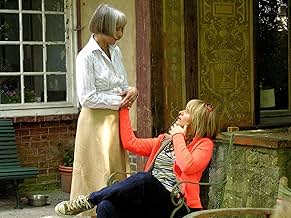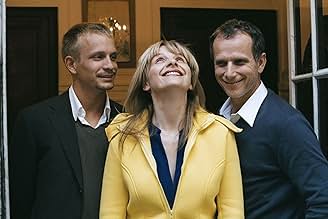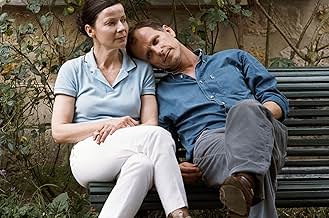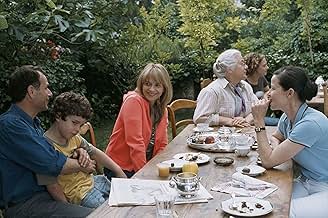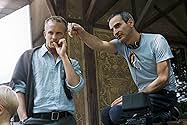PUNTUACIÓN EN IMDb
7,1/10
8,5 mil
TU PUNTUACIÓN
Dos hermanos y una hermana presencian la desaparición de sus recuerdos de infancia cuando deben ceder los bienes familiares para asegurar la sucesión de su madre fallecida.Dos hermanos y una hermana presencian la desaparición de sus recuerdos de infancia cuando deben ceder los bienes familiares para asegurar la sucesión de su madre fallecida.Dos hermanos y una hermana presencian la desaparición de sus recuerdos de infancia cuando deben ceder los bienes familiares para asegurar la sucesión de su madre fallecida.
- Dirección
- Guión
- Reparto principal
- Premios
- 9 premios y 23 nominaciones en total
Reseñas destacadas
Interesting, gentle sad (but not depressing) story of the inevitability of loss and chance.
Three siblings decide whether to keep or sell their mother's country home and art collection after her death, exploring how we give 'things' meaning, and how that meaning changes due to context, generation, and what we need from them.
But while the ideas are intriguing, and the acting good it never quite reached the deepest level of feeling or thoughtfulness for me.
Called a masterpiece by a number of critics, and something close by others, I cant quite go there, but it is an intelligent, quietly moving experience, that I'll probably revisit yet again, since it grew on me on a second viewing.
Three siblings decide whether to keep or sell their mother's country home and art collection after her death, exploring how we give 'things' meaning, and how that meaning changes due to context, generation, and what we need from them.
But while the ideas are intriguing, and the acting good it never quite reached the deepest level of feeling or thoughtfulness for me.
Called a masterpiece by a number of critics, and something close by others, I cant quite go there, but it is an intelligent, quietly moving experience, that I'll probably revisit yet again, since it grew on me on a second viewing.
A film about talented rich people squabbling, albeit very gently, about an inheritance would normally be a candidate to make my hackles rise. But 'Summer Hours' is a sensitive, subtle movie, that explores non-judgmentally what is important to us, and why: in short, how we define our emotional identities. The characters seem likable, but display an ordinary selfishness, and the film lightly samples the passions that make each of them tick. It's a very wordy movie, so much so, it could almost have been a stage play, but the director has a great sense of place, evoking his characters own feelings for place and the movie never feels heavy. In one sense, the ending is a touch underwhelming; but in keeping with the film's overall style. I liked it, a lot: the sort of film that only the French seem to make.
Hélène is the matriarch of an extended scattered family. She lives in the country outside of Paris where she has kept valuable art from a famous artist uncle. She has two sons and a daughter. The family gathers for her 75th birthday but at the end of the day, everybody leaves. The family has worked to keep the artist's legacy including a new art book and a world tour where Hélène does talks. Later, she passes and the family has to deal with the inheritance. The eldest Frédéric Marly wants to preserve the home. Adrienne (Juliette Binoche) is a famous designer in NYC. Jérémie is in China as a supervisor in a shoe company. They have to come to terms with the lost of their treasured memories.
It's French. It's talky. It's sincerely adult. It's family. When the siblings are all in one place, there is a feeling of a real family talking in a real way. The movie can drift from scene to scene. There is one standout among the third generation. She closes the movie in a profound scene. It's a family film in the truest sense.
It's French. It's talky. It's sincerely adult. It's family. When the siblings are all in one place, there is a feeling of a real family talking in a real way. The movie can drift from scene to scene. There is one standout among the third generation. She closes the movie in a profound scene. It's a family film in the truest sense.
Assayas says this film more or less sums up all his work so far, and that may surprise some, since it is so different, so indistinguishable in many ways from the work of other contemporary French filmmakers who deal with middle class life. And the impulse behind the film was something trivial and occasional, a request from the Musée d'Orsay to do something, as they'd asked Hou Hsiau-hsien (the result was Hou's 'Flight of the Red Balloon'). Hou's film uses the d'Orsay so incidentally I can hardly remember how it fits in; but Assayas takes the idea of a museum quite seriously and literally. His story is about a family, and a mother who dies in her mid-seventies leaving behind a house and a collection of museum pieces, works of art, furniture, and fine objects.
We begin with a scene quite conventional in French films: the seasonal family gathering. The 'Heure d'été' (summer hour), is a moment when adult siblings Adrienne (Juliette Binoche, the star of Hou's 'Balloon,' though including her again was not a d'Orsay requirement), Frédéric (Charles Berling, his third time in an Assayas film, and a kind of alter ego here), and Jérémie (Jérémie Renier) with parts of their families, have come to the family's beautiful country place to celebrate the 75th birthday of their mother Hélène (Edith Scob). Hélène is one of those perfectly slim, elegant, erect French women. She spends a lot of time telling Frédéric, to his annoyance, about the valuables the children will inherit when she dies, including a handsome 19th-century desk, display case, and other objects, the sketchbooks of her famous uncle, the artist Jean Berthier, two Corot paintings, and two large sketches by Odilon Redon. They will want to dispose of them all, she says, and the house. She has certain requirements. The D'Orsay wants the furniture; the sketchbooks must be kept together. Some objects she is giving to him.
After this sequence, Hélène is dead, perhaps a year later. She has gone to San Francisco for the start of a major traveling exhibition of Berthier's work, and there has been a presentation in France on his personal life (including the fact that he was gay, and other controversial information) which shook her considerably. And her involvement in the production of a book, a catalog, and the traveling exhibition all wore her down and left her devastated and empty when they were completed.
It is against Frédéric 's wishes, but when the siblings meet again, it's obvious Hélène was right and the possessions and the house must be sold, and the old housekeeper, Eloise (Isabelle Sadoyan) must be released. Jérémie, who works for a company that makes running shoes, is going to take his wife and kids to live in China permanently. Adrienne, who is a designer, lives in New York, and she's going to marry her American boyfriend and stay there. They can't go back to the country house regularly any more. It seems Frédéric gets a raw deal, because he, whom the dispersal of family heirlooms hurts the most, is going to have to deal with the nuts and bolts of the process, because he's the only one who lives in France. But that's the way it is, and what's more Jérémie needs money to set up in his new life in China.
Assayas goes into the details, even showing a meeting of the curators and administrators concerned with the donation at the Musée d'Orsay. They are particularly interested in the furniture and the Redons (the Corots are sold elsewhere). One official objects that these things will just go into storage.
This is a suavely composed picture, but it still comes across as the most elegant of instructional films, if such existed for showing at posh schools to teach children of the wealthy how to deal with inheritances in the world of globalization. Yes, globalization is what Assayas is talking about, though the word is used in his comments on the film, not in the screenplay itself. Assayas' didacticism this time is admirably straightforward, and at the same time, the ideas are presented in what for Assayas is an unusually warm context. One of the touchstones is the old housekeeper, Eloise, who returns to the house when it's been shut up, and goes to Hélène's grave to deposit flowers. The important point is that this is not about the traditional family squabble over inheritance. Though Frédéric is saddened, there is no argument, and he and Jérémie pointedly (maybe too pointedly) part friends. There are other little details that are accurate and practical. It's pointed out that Adrienne's plan to sell the sketchbooks in New York through Christie's won't work. The French government is unlikely to let them out of the country. Frédéric is away a lot too, and for whatever reason he has to pick up his teenage daughter, caught stealing, and holding pot. But the final scene, which again is warmly didactic, shows that daughter with her boyfriend and a bunch of her friends invading the old house one last time, saying a sad farewell..
As I'm not the first to comment, this is one of Assayas' simplest films, but it's also one of his most touching and meaningful. Instructional film though it may be, it deals with subject matter that can move the hardest heart. If you don't care about losing a parent, you will surely be touched with the thought of losing the places of your childhood--and family money. If love won't get you, money will. And there is a final meditation by Frédéric at the D'Orsay where he and his wife Lisa (Dominique Reymond) look at the objects they've donated (not in storage) and consider the other trade-off: a contribution to history and the public's culture has been made, but the objects are like prisoners now, shut up in a cold space, robbed of their human context in a family's life.
We begin with a scene quite conventional in French films: the seasonal family gathering. The 'Heure d'été' (summer hour), is a moment when adult siblings Adrienne (Juliette Binoche, the star of Hou's 'Balloon,' though including her again was not a d'Orsay requirement), Frédéric (Charles Berling, his third time in an Assayas film, and a kind of alter ego here), and Jérémie (Jérémie Renier) with parts of their families, have come to the family's beautiful country place to celebrate the 75th birthday of their mother Hélène (Edith Scob). Hélène is one of those perfectly slim, elegant, erect French women. She spends a lot of time telling Frédéric, to his annoyance, about the valuables the children will inherit when she dies, including a handsome 19th-century desk, display case, and other objects, the sketchbooks of her famous uncle, the artist Jean Berthier, two Corot paintings, and two large sketches by Odilon Redon. They will want to dispose of them all, she says, and the house. She has certain requirements. The D'Orsay wants the furniture; the sketchbooks must be kept together. Some objects she is giving to him.
After this sequence, Hélène is dead, perhaps a year later. She has gone to San Francisco for the start of a major traveling exhibition of Berthier's work, and there has been a presentation in France on his personal life (including the fact that he was gay, and other controversial information) which shook her considerably. And her involvement in the production of a book, a catalog, and the traveling exhibition all wore her down and left her devastated and empty when they were completed.
It is against Frédéric 's wishes, but when the siblings meet again, it's obvious Hélène was right and the possessions and the house must be sold, and the old housekeeper, Eloise (Isabelle Sadoyan) must be released. Jérémie, who works for a company that makes running shoes, is going to take his wife and kids to live in China permanently. Adrienne, who is a designer, lives in New York, and she's going to marry her American boyfriend and stay there. They can't go back to the country house regularly any more. It seems Frédéric gets a raw deal, because he, whom the dispersal of family heirlooms hurts the most, is going to have to deal with the nuts and bolts of the process, because he's the only one who lives in France. But that's the way it is, and what's more Jérémie needs money to set up in his new life in China.
Assayas goes into the details, even showing a meeting of the curators and administrators concerned with the donation at the Musée d'Orsay. They are particularly interested in the furniture and the Redons (the Corots are sold elsewhere). One official objects that these things will just go into storage.
This is a suavely composed picture, but it still comes across as the most elegant of instructional films, if such existed for showing at posh schools to teach children of the wealthy how to deal with inheritances in the world of globalization. Yes, globalization is what Assayas is talking about, though the word is used in his comments on the film, not in the screenplay itself. Assayas' didacticism this time is admirably straightforward, and at the same time, the ideas are presented in what for Assayas is an unusually warm context. One of the touchstones is the old housekeeper, Eloise, who returns to the house when it's been shut up, and goes to Hélène's grave to deposit flowers. The important point is that this is not about the traditional family squabble over inheritance. Though Frédéric is saddened, there is no argument, and he and Jérémie pointedly (maybe too pointedly) part friends. There are other little details that are accurate and practical. It's pointed out that Adrienne's plan to sell the sketchbooks in New York through Christie's won't work. The French government is unlikely to let them out of the country. Frédéric is away a lot too, and for whatever reason he has to pick up his teenage daughter, caught stealing, and holding pot. But the final scene, which again is warmly didactic, shows that daughter with her boyfriend and a bunch of her friends invading the old house one last time, saying a sad farewell..
As I'm not the first to comment, this is one of Assayas' simplest films, but it's also one of his most touching and meaningful. Instructional film though it may be, it deals with subject matter that can move the hardest heart. If you don't care about losing a parent, you will surely be touched with the thought of losing the places of your childhood--and family money. If love won't get you, money will. And there is a final meditation by Frédéric at the D'Orsay where he and his wife Lisa (Dominique Reymond) look at the objects they've donated (not in storage) and consider the other trade-off: a contribution to history and the public's culture has been made, but the objects are like prisoners now, shut up in a cold space, robbed of their human context in a family's life.
SUMMER HOURS (L'heure d'été) is more of a reverie than a story for a film. This very French film touches the subject of family - the meaning and influence and contradictions - in an examination of coping with the death of the matriarch and her wishes versus the intentions of the siblings. Writer/Director Olivier Assayas seems less interested in allowing the viewer to get to know the individuals of the story than he is with conveying the vacuum of death and the aftermath of dealing with it in the setting of a family of grown children.
The film opens as it closes - in summer with scenes awash with French countryside living. Three children have gathered with their families for the 75th birthday of their mother, the elegant and wistful Hélène (Edith Scob) whose adoration of her famous painter uncle presses on her mind as she senses her own mortality. One son, Frédéric (Charles Berling) is her confidant in hearing her wishes about the dispersal of the house and furniture and art that mean so much to her. Her other son Jérémie (Jérémie Renier) has traveled from his new home in China where his tennis shoes company has stationed him: his fondness for his mother is apparent but his need for financing makes him view the wishes of his mother in a more practical light. Her daughter Adrienne (Juliet Binoche) has traveled from her preferred new home in New York City and views the wishes of her mother with a similar practical and somewhat distant stance.
Some time later the mother dies and the children gather for the funeral and for the discussion of what to do with the 'inheritance'. The interplay between the sentimental Frédéric and the pragmatic Adrienne and Jérémie bring about questions of placing the art and furniture with museums and the selling of the house of their youth. Gentle undertones of sibling relationships and questions about the quality of memorabilia versus the practicality of getting on with living provide the final movement. The film ends in a coda that returns the younger generation (Hélène's grandchildren) to the beauty of the gardens of the now empty French house. The thread that holds the film together is the presence of the longtime housekeeper Éloïse (Isabelle Sadoyan), the gentle being that understands it all.
Though the film is beautifully acted and photographed there is very little development of the various characters, a fact that leaves the viewer with the feeling of simply peeking through a windowpane to watch a French family walk through a moment in life and in death. Nothing much happens here: the film is more a reverie, but a very beautiful one to relax and enjoy. Grady Harp
The film opens as it closes - in summer with scenes awash with French countryside living. Three children have gathered with their families for the 75th birthday of their mother, the elegant and wistful Hélène (Edith Scob) whose adoration of her famous painter uncle presses on her mind as she senses her own mortality. One son, Frédéric (Charles Berling) is her confidant in hearing her wishes about the dispersal of the house and furniture and art that mean so much to her. Her other son Jérémie (Jérémie Renier) has traveled from his new home in China where his tennis shoes company has stationed him: his fondness for his mother is apparent but his need for financing makes him view the wishes of his mother in a more practical light. Her daughter Adrienne (Juliet Binoche) has traveled from her preferred new home in New York City and views the wishes of her mother with a similar practical and somewhat distant stance.
Some time later the mother dies and the children gather for the funeral and for the discussion of what to do with the 'inheritance'. The interplay between the sentimental Frédéric and the pragmatic Adrienne and Jérémie bring about questions of placing the art and furniture with museums and the selling of the house of their youth. Gentle undertones of sibling relationships and questions about the quality of memorabilia versus the practicality of getting on with living provide the final movement. The film ends in a coda that returns the younger generation (Hélène's grandchildren) to the beauty of the gardens of the now empty French house. The thread that holds the film together is the presence of the longtime housekeeper Éloïse (Isabelle Sadoyan), the gentle being that understands it all.
Though the film is beautifully acted and photographed there is very little development of the various characters, a fact that leaves the viewer with the feeling of simply peeking through a windowpane to watch a French family walk through a moment in life and in death. Nothing much happens here: the film is more a reverie, but a very beautiful one to relax and enjoy. Grady Harp
¿Sabías que...?
- CuriosidadesThis film is part of the Criterion Collection, spine #513.
- PifiasGrandmother's two most valuable objects, the Corots, are hung where they'll both get lots of sunlight, guaranteed to damage the colors. Since once gets the definite impression that little in the house has changed over many years, these pictures would be toast by now.
- Banda sonoraLoftus Jones
Written by Turlough O'Carolan
Performed by Robin Williamson, Mat Maneri and Barre Phillips
Selecciones populares
Inicia sesión para calificar y añadir a tu lista para recibir recomendaciones personalizadas
- How long is Summer Hours?Con tecnología de Alexa
Detalles
- Fecha de lanzamiento
- País de origen
- Sitios oficiales
- Idiomas
- Títulos en diferentes países
- L'hora d'estiu
- Localizaciones del rodaje
- La Saglière, 8 Rue de Parmain, Butry-sur-Oise, Val-d'Oise, Francia(the Berthiers' house)
- Empresas productoras
- Ver más compañías en los créditos en IMDbPro
Taquilla
- Presupuesto
- 4.400.000 € (estimación)
- Recaudación en Estados Unidos y Canadá
- 1.657.001 US$
- Fin de semana de estreno en EE. UU. y Canadá
- 49.484 US$
- 17 may 2009
- Recaudación en todo el mundo
- 7.835.857 US$
- Duración1 hora 43 minutos
- Color
- Mezcla de sonido
- Relación de aspecto
- 1.85 : 1
Contribuir a esta página
Sugerir un cambio o añadir el contenido que falta

Principal laguna de datos
By what name was Las horas del verano (2008) officially released in India in English?
Responde







